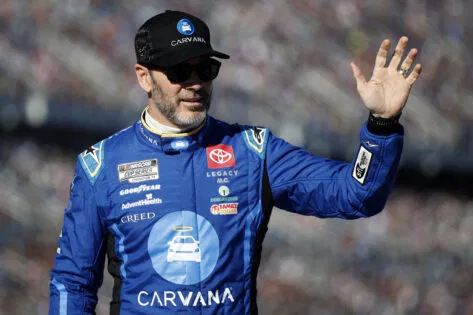Self-made millionaire behind $4 billion Skims, Emma Grede says it all began with a cold call

It was in 2015, and Grede had built her own entertainment and talent agency, Independent Talent Brand, which saw her jetting between London and LA. “I knew every manager, agent, publicist, lawyer in Hollywood, that was my job,” Grede recalls in an exclusive interview with Fortune.
And it put her in the perfect position for pitching her new idea: a radically inclusive denim brand tailored for women who’d been overlooked by mainstream fashion. In her mind, she’d already picked the perfect partner for the brand: Khloe Kardashian, who “embodied that idea right from the beginning.” The star had often been honest about her experience as the curvy sister.
But here’s the catch: Grede hadn’t run a fashion business before, and the two had never worked together. Instead of waiting for an introduction, she boldly called the family matriarch and “momager”, Jenner herself.
“I had an idea, and I formed the partnership in my mind,” the now 42-year-old self-made millionaire says. “The difference between me and someone else is that I made the phone call, I took the meeting, and I made it happen.”
“I have no imposter syndrome and no delusions of who gets to run a business,” Grede adds. “I just thought, if not me, then who?”
Jenner asked Grede when she’d next be flying to LA to discuss the partnership face-to-face. At the time, Grede was only flying that way once a quarter, but she quickly lied and said she was heading there the next week. So that’s exactly what she did—and the rest is history.
When Good American denim dropped a year later, it made $1 million on day one, making it the biggest denim launch in apparel history. And since then she’s gone on to sit on the board for the Obama Foundation and become the first Black female investor on Shark Tank. Most recently, she’s teamed up with tennis champion Coco Gauff on a mentorship campaign with UPS.
Now, Grede says she’s always advising founders to copy her, be more bold and put themselves out on a limb: “An idea in your head is just an idea in your head—a lot of people talk and speak about things a lot, sometimes you just got to do.”
Emme Grede says she’s always been ‘audacious’
Grede’s confidence isn’t luck—or even something she developed alongside the billion-dollar success of her businesses. It’s a trait she was just born with. “I’ve got a lot of audacity and I think that you need that to get to where you want to go,” the East Londoner tells Fortune.
In her late teens, for example, Grede had aspirations of working in Britain’s equivalent of Broadway. When the theatre bosses ignored her handwritten notes asking for work experience, she stormed there in person.
“I remember pounding the pavement in the West End,” she recalls. “I just thought, because I didn’t get any answers, that maybe they weren’t getting my letters. So I took to hand delivering letters.”
Even when she was holding down a day job, she’d boldly ask customers with enviable careers for work experience—and it’d work.
“When I was working in a clothes shop, I would talk to everyone, I’d be like, ‘where do you work? What would you do?” If a stylist came in on a Friday and was doing a shoot on the weekend, I’d be assisting them on the weekend. I did that multiple times.”
She says she’d actively put herself into “situations”, versus passively waiting for opportunities to come to her. After finding out where customers worked, she’d follow up with: “Do you need some help? Can I come?”
Grede’s advice for jobless Gen Z: Kill your darlings
Millions of Gen Zers are currently unemployed—or rather, NEETs, not in employment, education or training.
Grede, meanwhile, has been working since the start of high school.
“I have had a job since I was 12,” she says. “I started delivering newspapers, then I worked in a deli, then I worked in about four different clothing shops, then I spent a year and a half doing work experience in every small designer and PR agency in London. Then I worked for Quintessentially then I went to Inca productions, where I worked for a fashion show production company. And I changed my job after about three years there. So I went from being an event producer to running the sponsorship department, and then I started my own company.”
Essentially, each experience led to the next. She treated every role—no matter how unglamorous—as a way to collect skills, contacts, and credibility that stacked into her next move. Thanks to a habit of speaking up and standing out, she squeezed real, résumé-worthy experience out of even the most unassuming jobs.
Of course, even Grede experienced her fair share of no’s along the way: “I got very, very, very comfortable with rejection. If I think about how many things didn’t work out for me, there are a lot more than the things that seemingly on paper did work out.”
But she dusted herself off and tried again. It’s why her advice for those struggling to break in is to look at every experience as a step forward—even if it’s not the dream role yet.
“I would think about the idea of transferable skills,” she advises Gen Z job seekers. “We all set ourselves up to think about exactly what we might want to do. And the reality is that you can learn pretty interchangeable skills anywhere.”
Growing up, Grede was fixed on the idea of working in fashion. “I could have got a lot of those skills in an advertising agency or working in another creative industry,” she explains. Gaining experience at an art gallery or boutique and then working your way up the ladder, is much easier than pining for a job at a fashion house straight out of college. You just have to put aside your ego and prioritise building momentum, over perfection.
“I’d do anything to get yourself going in forward motion,” Grede explains.
“In England, we have that lovely saying, ‘killing your darlings’ and sometimes you just have to kill your darlings. You have to do whatever you’ve got to do to move forward. It’s better to just think about forward motion as opposed to being so fixated on what you’d originally imagined things would be like.”



